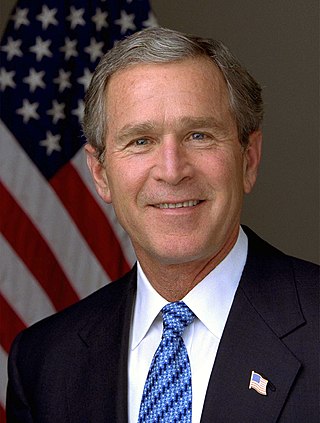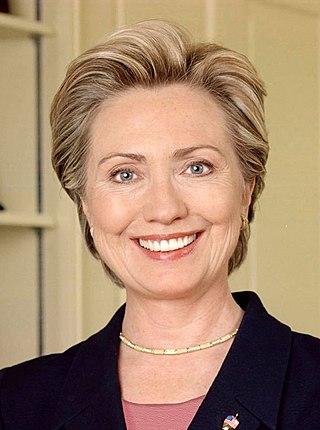
From January 14 to June 8, 2004, voters of the Democratic Party chose its nominee for president in the 2004 United States presidential election.

Super Tuesday is the United States presidential primary election day in February or March when the greatest number of U.S. states hold primary elections and caucuses. Approximately one-third of all delegates to the presidential nominating conventions can be won on Super Tuesday, more than on any other day. The results on Super Tuesday are therefore a strong indicator of the likely eventual presidential nominee of each political party.

From January 19 to June 8, 2004, voters of the Republican Party chose its nominee for president in the 2004 United States presidential election. Incumbent President George W. Bush was again selected as the nominee through a series of primary elections and caucuses culminating in the 2004 Republican National Convention held from August 30 to September 2, 2004, in New York City.
The results of the 2008 Democratic Party presidential primaries are the detailed outcomes of a series of contests by which members of the United States Democratic Party chose their candidate for the 2008 U.S. presidential election. The contests are held in each of the fifty U.S. states, as well as the District of Columbia, Puerto Rico, American Samoa, Guam, the U.S. Virgin Islands, and Democrats Abroad. The Northern Mariana Islands was the lone U.S. state or territory which did not have a primary or caucus election in 2008. The outcomes include totals of delegates selected as well as popular votes.

The 2008 North Dakota Democratic presidential caucuses took place on February 5, 2008, one of the many Super Tuesday nominating contests held that day. Barack Obama won the caucuses, securing 8 out of 13 national delegates.

The 2000 California Democratic presidential primary took place on March 7, 2000, as one of 16 contests scheduled on Super Tuesday in the Democratic Party primaries for the 2000 presidential election, following the Washington primary the weekend before. It was an open primary, with the state awarding 433 delegates towards the 2000 Democratic National Convention, of which 367 were pledged delegates allocated on the basis of the results of the primary.

From January 3 to June 5, 2012, voters of the Democratic Party chose its nominee for president in the 2012 United States presidential election. President Barack Obama won the Democratic Party nomination by securing more than the required 2,383 delegates on April 3, 2012, after a series of primary elections and caucuses. He was formally nominated by the 2012 Democratic National Convention on September 5, 2012, in Charlotte, North Carolina.
Democrats Abroad holds a primary awarding delegates to the Democratic National Convention to represent expatriate voters. This primary is conducted as part of the Democratic Party's presidential primaries. In some earlier elections, in place of a primary, a caucus system was used by Democrats Abroad to determine their convention delegations.

The 2020 North Dakota Democratic presidential caucuses took place on March 10, 2020, as one of several states voting the week after Super Tuesday in the Democratic Party primaries and caucuses for the 2020 presidential election. While the contest has in effect been a party-run open primary for the first time in North Dakota's history, the state party retained the traditional caucus name, classifying it as a firehouse caucus. The state awarded 18 delegates to the 2020 Democratic National Convention, of which 14 were pledged delegates allocated on the basis of the results of the election.

The 2000 Oklahoma Democratic presidential primary took place on March 14, 2000, as one of 6 contests scheduled the week after Super Tuesday in the Democratic Party primaries for the 2000 presidential election, following the Nevada caucuses the weekend before. The Oklahoma primary was a semi-closed primary, with the state awarding 52 delegates towards the 2000 Democratic National Convention, of which 45 were pledged delegates allocated on the basis of the results of the primary.

The 2000 Vermont Democratic presidential primary took place on March 7, 2000, as one of 16 contests scheduled on Super Tuesday in the Democratic Party primaries for the 2000 presidential election, following the Washington primary the week before. The Vermont primary was an open primary, with the state awarding 22 delegates towards the 2000 Democratic National Convention, of which 15 were pledged delegates allocated on the basis of the results of the primary.

The 2000 Idaho Democratic presidential primary took place on May 23, 2000, as one of three states voting the week after the Oregon primary in the Democratic Party primaries for the 2000 presidential election. The Idaho primary was an open primary, allowing voting of any registration to participate, and awarded 23 delegates towards the 2000 Democratic National Convention, of whom 18 were pledged delegates allocated, but not on the basis of the primary results. The Idaho caucus earlier in the year was the binding contest, where as the primary was simply a preference vote.

The 2000 South Carolina Democratic presidential caucuses took place on March 9, 2000, and was the only nominating contest that day during the Democratic Party primaries for the 2000 presidential election. The South Carolina caucus was a closed caucus, meaning that only registered Democrats could vote in this caucus, and awarded 53 delegates to the 2000 Democratic National Convention, of which 43 were pledged delegates allocated on the basis of the results of the caucus.

The 2000 Minnesota Democratic presidential caucuses took place on March 11, 2000, as one of three contests scheduled on the weekend following Super Tuesday in the Democratic Party primaries for the 2000 presidential election, following the Colorado primary and the Uth primary the day before. The Minnesota caucus was a open caucus, with the state awarding 90 delegates towards the 2000 Democratic National Convention, of which 74 were pledged delegates allocated on the basis of the results of the caucus.

The 2000 Wyoming Democratic presidential caucuses took place on March 25, 2000, the only contest scheduled that day. The Wyoming caucuses were a closed caucus, with the state awarding 18 delegates to the 2000 Democratic National Convention, of which 13 were pledged delegates allocated on the basis of the results of the caucus.

The 2000 South Dakota Democratic presidential primary took place on June 6, 2000, as part of the 2000 presidential primaries for the 2000 presidential election. 22 delegates to the 2000 Democratic National Convention were allocated to the presidential candidates, the contest was held alongside primaries in Alabama, Montana, New Jersey and New Mexico.

The 2000 Alaska Democratic presidential caucuses were held on April 22, 2000, as part of the 2000 presidential primaries for the 2000 presidential election. 13 delegates to the 2000 Democratic National Convention were allocated to the presidential candidates.

The 2000 Virginia Democratic presidential caucuses were held on April 15, 2000, as part of the 2000 presidential primaries for the 2000 presidential election. 79 delegates to the 2000 Democratic National Convention were allocated to the presidential candidates.

The 2000 Nevada Democratic presidential caucuses took place on March 12, 2000, as part of the 2000 presidential primaries for the 2000 presidential election. 20 delegates to the 2000 Democratic National Convention were allocated to the presidential candidates.









